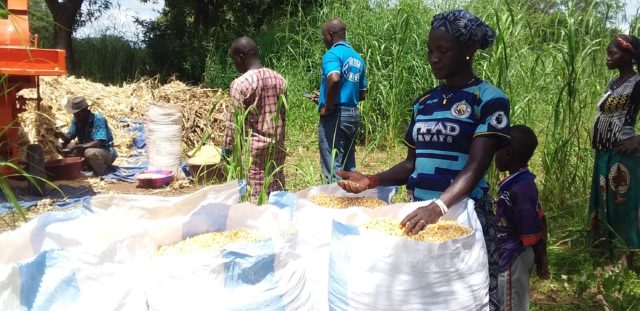Adapting to the Climatic Conditions Affecting Cashew Nut Production in Benin
In Gbaoussi, a village in the district of Nikki in Northern Benin, Yarou Saka Abdoulaye works as a cotton producer. However, when he is not working in his cotton field, he maintains and grows his cashew orchard— an initiative he started three years ago. Abdoulaye embarked on this endeavor to broaden his horizons and try something new but, with a high seedling mortality rate, it was difficult for him to achieve the desired results. To make matters worse, access to quality grafted seedlings was limited, mainly because of its sensitivity to climatic conditions.
The USDA West Africa PRO-Cashew Project worked with Abdoulaye and other farmers to address and overcome these issues, especially in the preliminary stages, through training sessions and cashew production strategy support to deal with the changing weather conditions. This includes the PRO-Cashew Project’s “Climate Change Adaptation System for Cashew Grafting Success” trainings, which help novice cashew growers and those facing challenges related to high plant mortality, introduce best practices and access quality grafted seedlings.
“Since 2019, when I started my orchard, I have seen three-quarters of my plants die,” Abdoulaye said. “People have told me that this is largely due to the recent climatic variability that Benin experiences. But, when I was enrolled in PRO-Cashew’s training and follow-up program, I understood that it is now possible to reverse this trend and realize my great dream of creating my cashew plantation.”

Yarou Saka Abdoulaye tends to his crops in Gbaoussi, Benin
Six months after receiving the training, Abdoulaye’s plants are growing well and thriving in his orchard, with grafted seedlings experiencing lower mortality rates. Of the 125 grafted plants he received from the Project, 123 are still alive, putting the mortality rate at only 1.6%. With the success of his cashew trees, he hopes to become a model for his community and help other producers adapt their farming practices to be more resilient against the area’s climatic variability.
“I would like to be able to share my skills and experience, helping other members of my community who are facing problems related to climate variability in their orchards,” Abdoulaye said.
He credits the PRO-Cashew Project and its on-farm training exercises for helping him and other local cashew producers better understand the difficulties they were going through, and for giving them the chance to carry out the remedial agricultural practices firsthand.
“They trained us theoretically and practically by giving us advice on what to do and what not to do, but above all by allowing us to practice the advice received in our different orchards,” he said.
One of the key methods used to optimize Abdoulaye’s cashew tree production is simple and can be done with easily accessible materials. With a 1.5-liter plastic water bottle, it is possible to install a drip irrigation system by turning it upside down against a stake at the foot of the plant, and unscrewing the cap slightly to allow water to drip. From here, all that is needed is for the bottle to be refilled once or twice a week through a hole at the base. Finally, to maximize the use of water, mulching is recommend especially in areas with a low risk of a termite attack.








Recent Comments